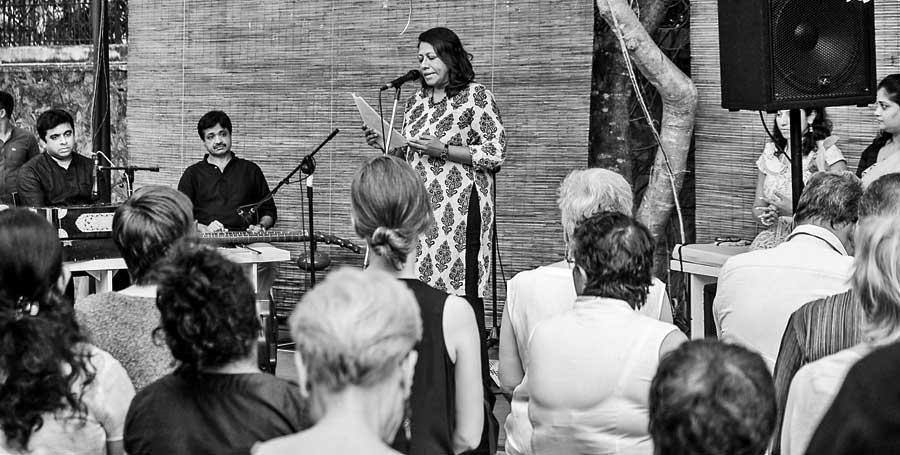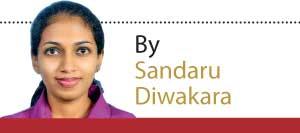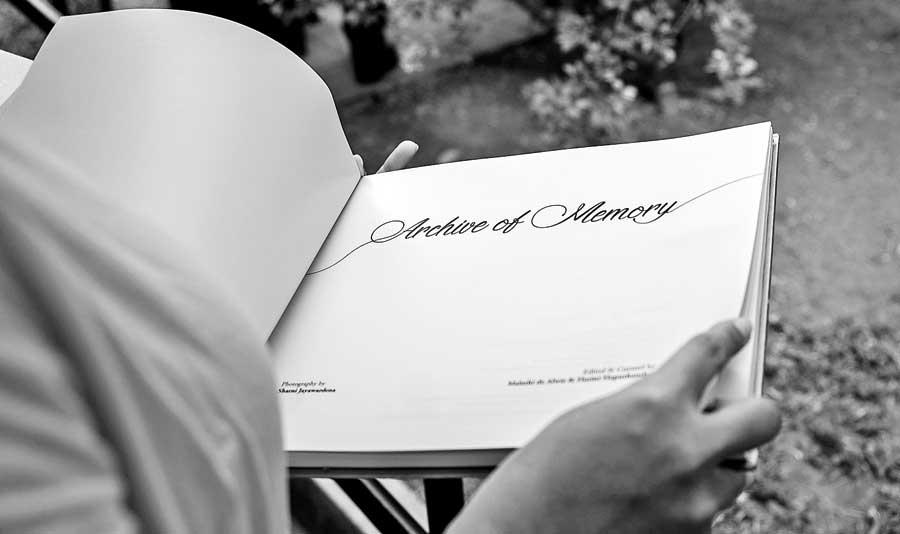Reply To:
Name - Reply Comment

Dr. Malathi de Alwis
Who validates History?
Time and memory are closely intertwined, as it seeps away quite unconsciously, adding meaning to the oscillating moments between past and future. Some of these moments are deemed worthy of notice and recorded as history, while a large collective of moments are lost in transition. However, who gets to determine which memories are to be recorded and which are to be ignored?
Usually, history is accused as a subjective chronicle, dictated by the winners of battles or the authorities in power, where an ordinary individual’s memories are deemed less significant. However, to ignore the significance of these individual memories and the substance of their feelings would be a mistake, as history is very much personal to each and every one of us, as much as it is political. If the individuals start forgetting, the entire narrative of history will lose its authenticity and credibility.
Launch of ‘Archive of Memory’
Not many have attempted to remedy this fallacy, specifically within Sri Lankan history. ‘Archive of Memory’ appears at such a juncture, trying to read the trajectory of post-independence Sri Lanka with a more personalised touch. It was launched on 25th February 2020 in Sooriya Village, with the participation of many acclaimed guests.
According to the curators of ‘Archive of Memory’, Dr. Malathi De Alwis and Hasini Haputhanthri, they have selected 70 individual narratives “to recall seventy years of Sri Lanka’s independence from 1948 to 2018”. Dr. Malathi de Alwis is a socio-cultural anthropologist who has published extensively on issues of nationalism, militarism, humanitarianism and feminism in Sri Lanka. Hasini Haputhanthri is an  independent consultant and researcher who has worked with a host of local and international organisations on a wide array of projects. As the curators have stated,
independent consultant and researcher who has worked with a host of local and international organisations on a wide array of projects. As the curators have stated,
“While there is much to celebrate in our overthrowing a 500-year yoke of colonial rule and embracing democratic politics, it is undeniable that Sri Lanka’s post-independence trajectory has also been rather turbulent and bloody. Communal riots, youth insurrections, natural disasters and protracted civil war have cast a long, brooding shadow across recent decades. Any reflection of our past must therefore acknowledge the positive advances we have made as a nation as well as question and learn from our less positive experiences.”
Rather than following a unitary narrative voice, ‘Archive of Memory’ looks at this historical trajectory through the eyes of different individuals. The selected 70 storytellers were “representative of the multi-ethnic, multi religious and multi-lingual melting pot that is Sri Lanka…[who] spanned a vast array of professions from artists and activists to diplomats and domestic aides to soldiers and sex workers to teachers and tailors”. This variety offers unique and multiple narratives and counter-narratives, that go above and beyond the mundane unitary historical tales that we are used to.
Consolidation of History through Different Memories…
For instance, Sunethra Bandaranaike shares the story about her mother’s ‘wedding necklace’. As a woman, mother and a wife, Sirimavo Bandaranaike was not expected to lead the country. Yet, she became the first democratically-elected woman head of state in the world and a played a key role in the Sri Lankan and International political arena. These commonly known historical details are related through the eyes of her daughter and the story of her mother’s wedding necklace.
Wijaya Jayatilaka from Kandy (originally from Bibile) narrates how the 1956 Sinhala Only Act affected his relationship with his father and his family. He shares this story using his school ‘report card’. His father and his five older siblings were fluent in English as they have studied before the Sinhala Only Act was passed, while Wijaya and his four younger siblings had to struggle with the English language. He recalls how he was reprimanded by his father for not speaking in English and got a tongue lashing when low marks appeared for English in his report card.
Naazima (pseudonym), a woman from Hambantota recalls the tragedy of tsunami disaster and how she lost most of her family, including her daughter and the unborn child. As she has shared, “I [Naazima] was like a mad woman after that and would spend most of my days brooding by the beach weeping and calling my daughter’s name and asking her to forgive me for abandoning her.” She was only able to gain her sanity back when she finds the ‘silver brooch’ of a little elephant that belonged to her daughter in the beach, quite by chance. So, Naazima shares the story of this silver brooch and how it allowed her to gain some semblance of peace after the disaster.
"All of these stories are connected with an object, which offers more meaning and more insight towards the shared story and its historical reference"
Tania Pathirage shares how she narrowly escaped death along with her mother on 27th November 2007, when LTTE exploded a bomb in No Limit, Nugegoda. They were able to save themselves, only because they unintentionally got delayed. However, she states that “when I see a No Limit bag, even eleven years later, my heart begins thudding with fright, like it did that day”.
These four stories alone prove how ‘Archive of Memory’ becomes significant. Passing of the Sinhala Only Act in 1956, assassination of S. W. R. D. Bandaranaike in 1959, election of Sirimavo Bandaranaike as the Prime Minister, the tsunami disaster in 2004, the three decade war with LTTE and the bomb blast in No Limit in 2007 are chronologically recorded in the Sri Lankan historical records. Yet, they never offer the familiarity and the emotional involvement offered through these narratives.
Moreover, it has attempted to cover the post-independence historical journey of Sri Lanka quite thoroughly, where the liberalisation of the economy in 1977, the increased communal disharmony and Black July Riots of 1983, the JVP insurrections of 1988-89 and the escalation of the war between Sri Lankan military and the LTTE etc. are recorded through the narratives of those who personally witnessed or experienced them. So, the narratives in ‘Archive of Memory’ offer a quite authentic and unique perspective of reading history and looking at these events.
Remembrance and Objects: A New Approach
Another feature that makes ‘Archive of Memory’ an extremely interesting read, is the approach used by the curators to share these narrative fragments of the selected individuals. All of these stories are connected with an object, which offers more meaning and more insight towards the shared story and its historical reference. According to the curators of the archive,
“What also knits together all seventy objects is their familiarity and ordinariness – a bangle, handbag, pair of spectacles, baby shoe, saucepan, swing. Some objects like the slate pencil, killota, and pin thaliya may retain the quality of curiosities to younger generations due to leaps in time and technology. For most of us, however, these may be everyday objects of scant regard, but for each of our seventy raconteurs, they are deeply meaningful, often redolent of painful or tender or nostalgic memories. The very materiality of the objects evoke presence and offers a palpable immediacy to the stories. Reading the narrative fragments and viewing objects associated with each fragment will hopefully also ‘liberate’ our own individual and collective memories.”
Along with the narratives of the each individual, the objects of their reference are also included within the book, which were beautifully captured by Sharni Jayawardene. So, reading ‘Archive of Memory’ can be a cathartic experience, where we get to see our own country’s history through different perspectives, different objects and a new light. These books could be obtained from Perera Hussein Publishers, Sarasavi Bookshop, Poobalasingham bookshops and Memory Culture office, for those who are interested. They are available in Sinhala, Tamil and English, making them accessible to the local as well as to the international audience.
Memory against Forgetting…
As the famous Czech writer Milan Kundera states, memories are a vital part of a country’s history. In ‘The Book of Laughter and Forgetting’ he shares, “The first step in liquidating a people…, is to erase its memory. Destroy its books, its culture, its history. Then have somebody write new books, manufacture a new culture, invent a new history. Before long the nation will begin to forget what it is and what it was. The world around it will forget even faster.”
So, knowing our roots and the stories of our own history would help us to understand and to not to forget the important lessons. Without the memories of our roots, we would forget our own identities and forsake our own origins. ‘Archive of Memories’ goes a further step and highlights the importance of an individual’s memory towards the trajectory of a country’s history.
It foregrounds the complexities and contradictions in historical narratives and collective memory, encouraging a “dialogue on history-making and how we recall and reflect on our many and varied pasts.” Most importantly, ‘Archive of Memory’ offers a “deeper and more complex understanding of contemporary Sri Lankan history, politics, and culture particularly from a people’s perspective” attempting to nurture tolerance, sympathy, and empathy within our fissured and fractured society.

Archive of Memory